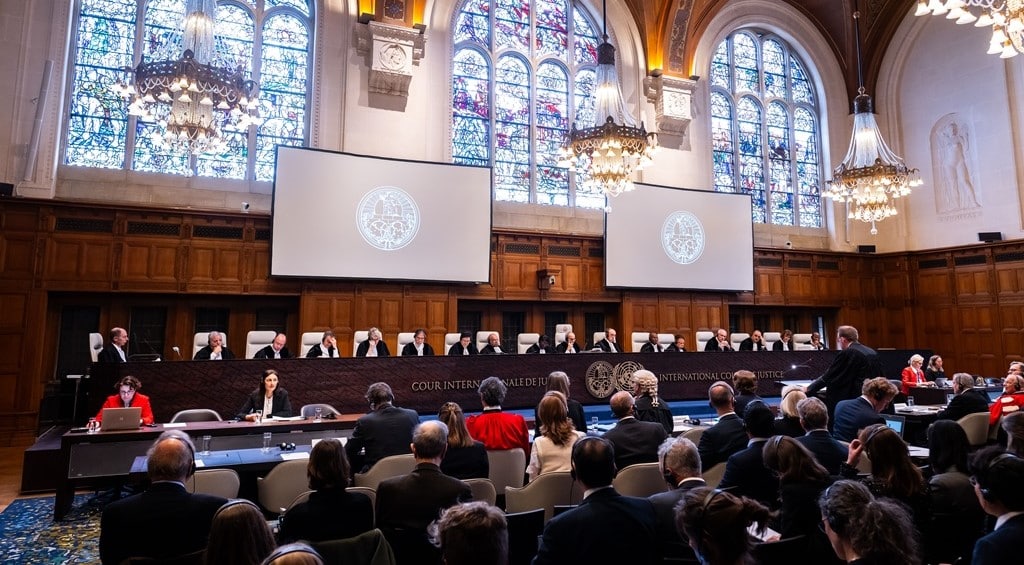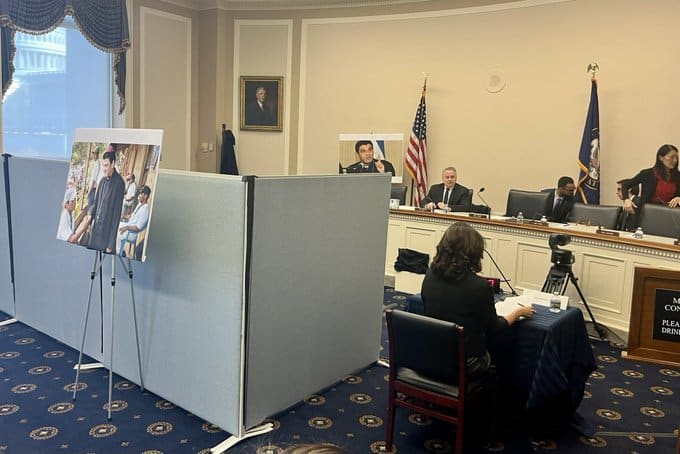3 de diciembre 2023

ICJ Rules Against Nicaragua's Request For Germany to Halt Arms Sales to Israel

PUBLICIDAD 1M
PUBLICIDAD 4D
PUBLICIDAD 5D
Nicaraguan priests described to U.S. Congress how the Ortega regime tried to force them to incriminate imprisoned Monsignor Alvarez

U.S. House of Representatives Committee hearing, presided over by Rep. Chris Smith. Courtesy photo: Juan Sebastian Chamorro.
Two Nicaraguan priests, released and banished in February 2023 by the regime of Daniel Ortega and Rosario Murillo, denounced that during their interrogations in the El Chipote prison, officials pressured them to declare that the bishop of Matagalpa, Rolando Álvarez, was trying to plan a coup.
Both religious leaders testified anonymously before the US House of Representatives Foreign Relations Committee. Their statements were part of a hearing in which members of civil society and US Congressmen demanded the release of Monsignor Álvarez. The bishop, detained in August 2022, is currently serving a 26-year sentence in Nicaragua’s El Modelo prison, after a lightning “trial” that followed his refusal to accept banishment.
“During the interrogation sessions, they threatened me and my family, because they wanted me to declare that the bishop was a member of an organization that promoted a coup d’état and that received money from the United States and the European Union,” testified one of the priests. The cleric had arrived in Washington last February, along with 221 other political prisoners who were expelled from Nicaragua and stripped of their nationality.
“Other interrogations had to do with the sermons the bishop had given (…) in which, according to them, he was inciting people to rise up and protest against the Government,” the priest continued.
He added: “it’s clear that this is a manipulation practiced by the same Government that doesn’t like to listen to the Truth and Voice of the Catholic Church. From that date on, an open persecution began of Catholic organizations such as Caritas, the Juan Pablo II University, and more recently the Central American University (UCA), thus affecting university autonomy and academic freedom.”
The release of Bishop Alvarez is one of the principle demands of a broad majority of Nicaraguans, according to a recent poll sponsored by Confidencial. Conducted by the Costa Rican branch of CID Gallup, the survey included the question: “What’s your opinion of bishop Rolando Alvarez’ prison sentence?” Seventy-two percent of those responding expressed disagreement, because the religious leader “is innocent,” and “should be released.” Nineteen percent stated that they didn’t know or failed to answer, and only 9% answered “He’s guilty, or “He should be a prisoner.”
The priests’ interrogations began on August 19, 2022, the same day they were forcibly removed from the Matagalpa Curia and transferred to the El Chipote jail. According to their declarations, they were forced to attend over 30 interrogation sessions held at all hours of the day and night, including the wee hours of the morning.
“They [the questions] were always directed at the Monsignor, as if he were the only thinking being, and the organizer of the supposed failed coup d’etat [as the regime insists on characterizing the massive 2018 popular protests]. They accused him of wanting to organize a new coup,” declared the second priest to offer testimony.
In [the interrogators’] eyes, the religious leader noted: “we were members of a criminal organization whose leaders were the bishops, with Alvarez at the head.”
They accused me of giving hate speeches, of organizing an uprising,” recalled the priest, who also recalled the prison officials asking: “if I was following orders of Monsignor Rolando,” and “What were those orders?”
Other recurring questions included: “What did the prelate do in his meetings? What was said when they met in the parish churches? Were they really conducting spiritual retreats, or were these sessions to speak badly about the government? Who was in charge of the (Church) media?”
Upon being asked by a committee member if the Catholic Church in Nicaragua has the capacity to galvanize the opposition, the priest rejected the idea of becoming involved in political issues. “Our mission is to preach the social teachings of the Church and the Gospel, with all their consequences,” he stressed.
The hearing conducted by the US House of Representative Foreign Relations Committee took place two days after the Ortega regime released 34 photos and a video of Bishop Rolando Alvarez. The bishop appears gaunt, with visible weight loss. The images were supposedly taken during family visits and medical check-ups, during which those present were not allowed to express themselves freely.
The Nicaraguan Interior Ministry published the images on the night of November 28, 2023, a day after Monsignor Alvarez’ 57th birthday. It was the second birthday the bishop has spent behind bars.
“We call on President Daniel Ortega to release Bishop (Rolando) Alvarez from prison and let him free,” Representative Christopher Smith (R – N.J.) expressed at the beginning of the hearing.
Bishop Alvarez, detained on August 19, 2022, has refused to be banished, despite the regime’s attempts to expel him from his homeland.
In February, he refused to board an airplane that carried 222 banished political prisoners to Washington. The religious leader was then summarily sentenced to over 26 years in prison and transferred to a punishment cell within Nicaragua’s National Penitentiary System. Last July, he was removed from his cell, only to be once again returned there when an agreement for his definitive liberation failed.
Representative Smith praised the Monsignor’s courage. He also remarked that the video released by the Ortega regime, showing the “good conditions” the religious leader supposedly enjoys in prison, has sparked “serious doubts and concerns” regarding the bishop’s actual situation.
“The striking array of food and drink on the two tables in the government video is eerily reminiscent of a trip Congressman Frank Wolf made in 1989 to Camp Perm 36 – the infamous Soviet political prison in the Ural Mountains. After meeting and recording video of two dozen malnourished political prisoners, the camp director took us to the cafeteria. Every table had an abundance of food, and every trash can was filled to overflowing with excess food,” Smith said.
The relations between the Sandinista dictatorship and the Catholic Church are experiencing moments of high tension, marked by the imprisonment, expulsion and banishment of priests and nuns, as well as the prohibition of religious activities and the suspension of diplomatic relations.
In June 2023, the Ortega regime’s justice system accused the Catholic Church of money laundering. They then used the charge to justify the arrests of priests, alleging they were under investigation, and the freezing of the Church’s bank accounts. Daniel Ortega has described the Church as a “mafia,” while, Pope Francis has called the Sandinista regime a “crude dictatorship.”
The latest CID Gallup survey conducted in Nicaragua asked: Is there persecution against priests and parishioners of the Catholic Church in Nicaragua? 57% said “yes”; 33% responded “no”; and 10% stated they either “don’t know” or “have no response.”
This article was published in Spanish in Confidencial and translated by Havana Times. To get the most relevant news from our English coverage delivered straight to your inbox, subscribe to The Dispatch.
PUBLICIDAD 3M
Confidencial es un diario digital nicaragüense, de formato multimedia, fundado por Carlos F. Chamorro en junio de 1996. Inició como un semanario impreso y hoy es un medio de referencia regional con información, análisis, entrevistas, perfiles, reportajes e investigaciones sobre Nicaragua, informando desde el exilio por la persecución política de la dictadura de Daniel Ortega y Rosario Murillo.
PUBLICIDAD 3D